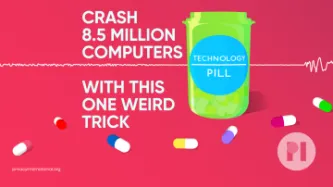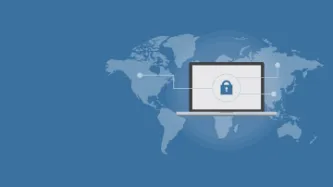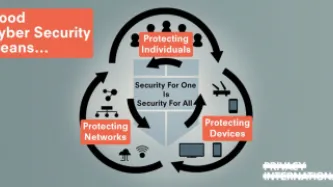Search
Content type: Video
Links Read more about your optionsLearn more about PI's position on the Cyber Resilience Act
Content type: Video
Links- Read our in-depth article about what happened and what it tells us about the security and robustness of the modern internet- Find more about the 911 outages across several US states- CrowdStrike's own review of the problem- Our podcast on the XZ exploit- Facebook VPN exploitation- The philosopher Caitlin was thinking of was Paul Virilio
Content type: Long Read
What happened?On 19 July 2024, American cybersecurity company CrowdStrike released an update to its CrowdStrike Falcon software that ultimately caused 8.5 million computers running Microsoft Windows to crash. The damage done was both deep and wide: deep because the computers affected were unable to recover without direct user intervention. Wide because a whole range of companies - from airlines to healthcare to media - across a whole range of countries - from Sweden to India to New Zealand -…
Content type: Report
Introduction
Several policy initiatives are in progress at the EU level. They seek to address the sustainability of connected devices such as smartphones, tablets and smart speakers. While initiatives to extend the useful life of hardware are important, software must not be ignored. Almost any digital device with which we interact today relies on software to function, which acts as a set of instructions that tells the hardware what to do. From smart thermostats to smart speakers, to our…
Content type: Explainer
With more and more connected devices around us, the chance that you've been hit by an update notification is high. But what do these software updates do? How do they actually work, and why are they important?
Hardware and Software
Modern electronic devices require two main parts to function: the hardware and the software. The hardware usually refers to physical electronic pieces inside a device (usually a collection of microchips, logic gates and specialised processing chips, such as those to…
Content type: Advocacy
Our environment is increasingly populated by devices connected to the Internet, from computers and mobile phones to sound systems and TVs to fridges, kettles, toys, or domestic alarms. There has been research into the negative safety and privacy impacts of inadequate security provided by the software in such devices (such as the creation of large scale botnets). This is also the case with outdated security, a risk enabled by software support periods that are shorter than a product’s usable life…
Content type: News & Analysis
Privacy International has joined a global coalition of privacy campaigners, tech companies, and technology experts to respond to proposals by British intelligence chiefs aimed at allowing them access to encrypted messaging apps such as WhatsApp or Signal.
If implemented, the proposals would allow government authorities to force messaging platforms to silently add a law enforcement participant to a group chat or call.
Such a capability poses serious threats to…
Content type: News & Analysis
As the international cyber security debate searches for new direction, little attention is paid to what is going on in Africa. Stepping over the remains of the UN Group of Governmental Experts, and passing by the boardrooms of Microsoft struggling to deliver their Digital Geneva Convention, African nations are following their own individual paths.
Unfortunately, these paths increasingly prioritise intrusive state surveillance and criminalisation of legitimate expression online as…
Content type: News & Analysis
There are three good reasons why security is so hard for NGOs. First, we are afraid to speak about meaningful security. Second, we focus on the wrong areas of security and in turn spend money and prioritise the wrong things. Third, we struggle to separate the world we want from the worlds we build within our own organisations. At PI we have failed and struggled with each of these for over 20 years. Out of exhaustion, we decided to do something about it: we are building an open framework, a…








